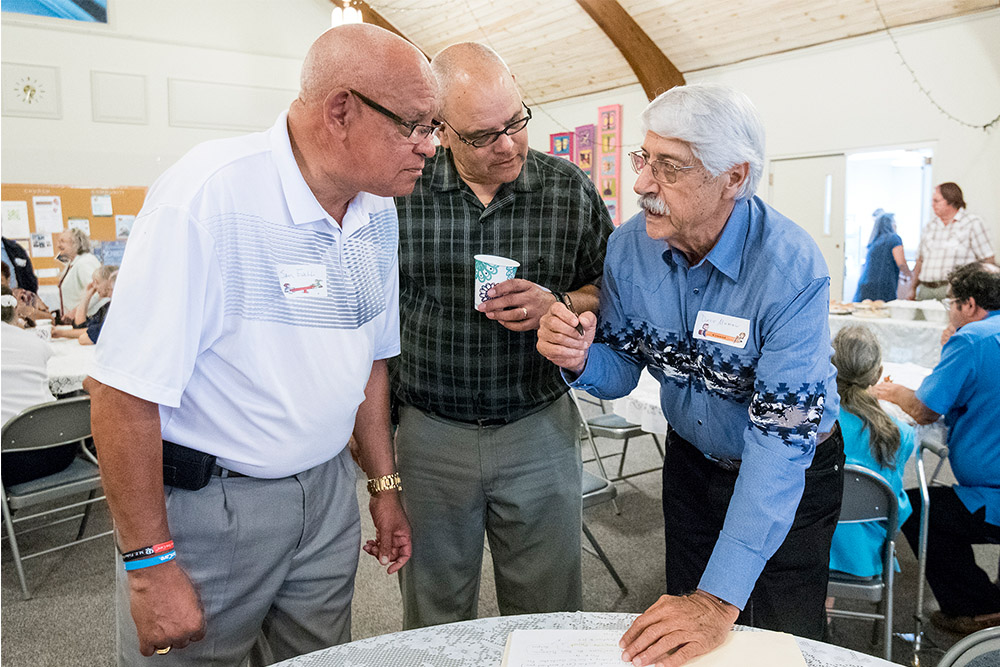The reunion Sunday evening [Sept. 3] that heralded the 99th anniversary of the opening of Park School did more than bring together friends from an educational institution that closed 50 years ago.
With the presentation of a documentary made by Broadway High School students about five members of the African-American Ewell family starting classes in 1964 at what was then Park Elementary School, the school’s historical importance was highlighted. The viewing of “The Ewell Family and the Integration of Park School” was a highlight of the event held at Park View Mennonite Church, drawing a standing ovation from the crowd of about 60 people.
Siblings integrate school
The 16-minute, 45-second video — available at youtube.com by searching for “Park School integration” — recounts how Samuel and Lucille Ewell left Prince Edward County in 1959 when it shuttered its public schools to avoid integration. Five years later, their children broke the color barrier at a previously all-white Rockingham County public school.
“It was just amazing to us that something that happened so far away could affect our own local community here,” BHS senior Brad Custer, the documentary’s editor, said of his thoughts while working on the project with fellow students Ryan Showalter, Andrea Troyer, Isaac Morris and Aubree Morris.
Beau Dickenson, coordinator of history and social science education for Rockingham’s schools, said in introducing the film the fact that young African-American students were welcomed without issue in an era of racial turbulence speaks well of the Park View community and the county school system.
“In an era of Virginia history when we were closing doors,” he said, “Rockingham County — through the Ewell family experience — saw them forced open, and that is an amazing story that our students have been honored to tell.”
Mennonite values
The closing of schools in Prince Edward during the era of state government-led massive resistance to desegregation cost the Ewells more than access to education for their children. Because Samuel was assistant principal at all-black R.R. Moten High School, it put him out of a job. The family packed up and moved to Harrisonburg, Lucille’s hometown.
The Ewell children attended the city’s Lucy F. Simms School until the summer of 1964, when they moved into the Park View community in what was then Rockingham County. When school started that fall, oldest brother James headed to what was then John C. Myers Middle School in Broadway and his siblings went to Park Elementary School, a three-room neighborhood school on Park Road. In doing so, the Ewells became the first children to integrate Rockingham schools.
Margaret Ewell recounted bracing for trouble when nine or 10 white children approached her and her siblings as they played one day. Instead, Joyce Martin introduced herself and the rest of the group.
“The kids were just sweet,” said Margaret Ewell, a Hampton resident, “and we had to kind of tone down our fears of what could happen.”
“We were very well accepted, and that was probably mainly because Park View at the time was 90 percent Mennonite,” said Broadway resident Charles Ewell. “The Mennonite faith is rooted in peace and nonviolence basically, and … all people are equal.”
Troyer, a researcher on the documentary, said that affirmation of the religion’s embrace of people from different cultures touched her as the project unfolded. “Even as time has passed,” she told reunion attendees, “the values of the Mennonite faith have stayed the same, that they are still accepting to others of different race, of different ideas, and they will allow them to come into their church, into their school.”
Keynote speaker Myron Augsburger, president emeritus of Eastern Mennonite University, said Mennonites embraced integration “as a matter of conviction,” not to foster social change. But social change happened, thanks in part to families like the Ewells. “Today, I want to tell the Ewell family that we thank God for you,” he said. “We’re very thankful that God brought you to our community.”
